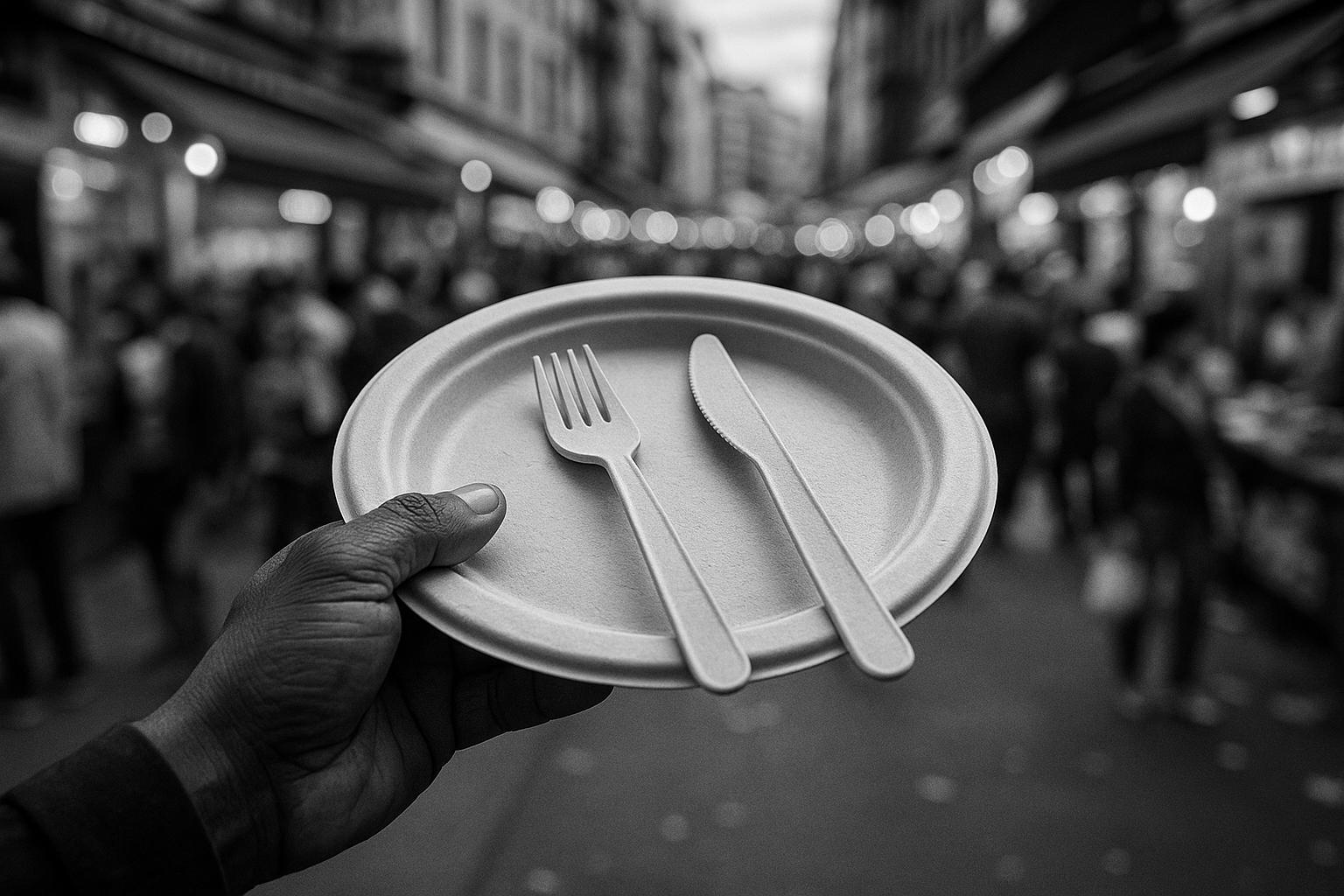From street markets to Michelin-starred restaurants, UK food operators are rapidly adopting certified compostable tableware driven by new plastic bans, consumer demand, and innovations, marking a major shift in the nation’s dining culture and environmental responsibility.
Across the UK, from lively street food markets to prestigious Michelin-starred restaurants, compostable tableware is swiftly becoming the hallmark of the foodservice industry. This surge reflects a broader shift driven by regulatory mandates, rising consumer environmental consciousness, and the hospitality sector’s commitment to sustainable practices. Whether diners are grabbing a quick bite at a pop-up market or enjoying a premium meal, the packaging that comes with their food now increasingly aligns with values of health, ethics, and environmental stewardship.
The changing food culture in the UK has been a significant factor in this transition. The growing popularity of street food vendors and pop-up markets has brought a demand for convenient yet environmentally responsible packaging options. Meanwhile, fine dining establishments, including renowned Michelin-starred venues and celebrated groups, have integrated compostable tableware into their takeaway and delivery services, demonstrating that sustainability and quality are not mutually exclusive. As one chef pointed out, sustainability has evolved beyond being merely a value add—it’s now integral to competitive advantage and customer loyalty.
This momentum is fueled by a complex interplay of policy, market demand, and social trends. The 2024 UK ban on single-use plastics has compelled operators to rethink packaging entirely, while complementary regulations from the EU and Scotland reinforce these standards. Consumer preferences amplify this trend, with surveys indicating that over 70% of UK diners favour brands demonstrating a clear commitment to sustainability. Social media campaigns spotlighting plastic-free dining and eco-friendly practices heighten public expectations, creating a business imperative rather than a marketing choice. Major supermarkets and delivery platforms like Deliveroo, Just Eat, Waitrose, and Tesco are also spearheading initiatives to normalise compostable packaging, supporting suppliers and educating customers in the process.
Compostable tableware primarily consists of plant-based materials such as bagasse (the fibrous residue from sugarcane), cornstarch-based bioplastics like PLA, bamboo, and palm leaves. Unlike the often ambiguous term “biodegradable,” compostable products are certified to break down fully and safely in industrial composting conditions, leaving no harmful residues. This certification—often indicated by labels such as BPI, OK Compost, EN13432, or ASTM D6400—ensures the products meet stringent environmental and food safety standards. These materials offer notable advantages: they are free from harmful chemicals like BPA and PFAS, have a lower carbon footprint compared to plastics, and are versatile enough to handle hot or cold foods, oily or liquid dishes, and even function in microwaves or freezers. Additionally, compostable tableware supports modern branding efforts, allowing bespoke logo printing and stylish presentations across all dining formats.
The adoption of compostable tableware spans the full spectrum of the UK food industry. Iconic street food hubs such as London’s Borough Market and Manchester’s Food Festival have witnessed enthusiastic uptake among vendors keen to attract environmentally aware customers. On the fine dining front, venues known for excellence have embraced green packaging, underscoring how sustainability dovetails with premium culinary experiences. At the corporate and retail level, collaborations between large delivery platforms and suppliers facilitate bulk procurement and compliance, ensuring that compostable solutions are accessible and seamlessly integrated.
Leading manufacturers play a crucial role in meeting this rising demand. Companies like Bioleader® from China have emerged as key global suppliers, offering a wide range of certified compostable items including bagasse containers, cutlery, trays, and cups. These providers not only ensure compliance with international food safety and compostability standards but also assist businesses in navigating the transition through custom branding options, bulk ordering solutions, and regulatory guidance.
Despite these advantages, challenges remain. Compostable tableware typically costs more upfront than conventional plastics, and integrating reliable supply chains requires planning. Moreover, consumer education around correct disposal—ensuring compostable products end up in the right waste streams—is essential to realise the full environmental benefits. Many foodservice operators are overcoming these barriers through cooperative purchasing, quality-focused supplier partnerships, and clear, informative in-store signage.
Looking ahead, the compostable tableware market is poised for significant expansion both within the UK and globally. Current forecasts predict growth at rates between 4.6% and over 9% annually across various reports, driven by technological advancements that enhance product functionality and durability. Innovations improving heat and water resistance alongside regulatory tightening will further embed compostable tableware as a necessary standard. Moreover, investment in composting infrastructure and circular economy initiatives promises to close the loop on foodservice waste, making sustainable dining an achievable norm.
Ultimately, the rise of compostable tableware reflects a deeper evolution in British food culture—one that balances convenience and quality with a robust environmental conscience. As more vendors, restaurants, and consumers embrace this green transformation, the UK is positioning itself as a global leader in sustainable dining innovation, setting new standards for what it means to eat responsibly in the 21st century.
 Reference Map:
Reference Map:
- Paragraph 1 – [1], [4]
- Paragraph 2 – [1], [3]
- Paragraph 3 – [1], [2], [5]
- Paragraph 4 – [1], [3], [4]
- Paragraph 5 – [1]
- Paragraph 6 – [1]
- Paragraph 7 – [2], [5], [6], [7]
Source: Noah Wire Services
- https://www.londondaily.news/from-street-food-to-fine-dining-why-compostable-tableware-is-becoming-the-new-standard-in-the-uk/ – Please view link – unable to able to access data
- https://www.londondaily.news/compostable-tableware-market-set-for-growth-with-tech-policies/ – The global compostable tableware market is projected to grow from USD 11.04 billion in 2024 to USD 17.37 billion by 2034, driven by environmental concerns and consumer demand for sustainable alternatives to single-use plastics. Compostable tableware, made from plant-based materials like sugarcane bagasse, bamboo, and PLA, decomposes naturally within 90–180 days in industrial composting environments. The market is also influenced by technological advancements and government mandates promoting eco-friendly solutions. However, challenges such as high production costs and the need for specific composting conditions remain.
- https://www.businesscoot.com/en/study/the-disposable-tableware-market-united-kingdom – The UK disposable tableware market features companies like Vegware, Biopac UK Ltd, London Bio Packaging, Planglow, and Go-Pak UK, which offer compostable and biodegradable products made from materials such as sugarcane pulp, cornstarch, PLA, and bamboo. These companies focus on providing environmentally friendly packaging solutions to reduce the environmental impact of single-use products in the foodservice industry.
- https://www.prnewswire.com/news-releases/restaurantware-launches-the-sustain-collection-a-game-changer-in-compostable-foodservice-packaging-302231665.html – Restaurantware has introduced the Sustain collection, a line of fully compostable alternatives for over 40 popular packaging items, including window boxes and sandwich boxes. Many items are crafted using bamboo paper, a rapidly renewable resource, and lined with PLA bioplastic to ensure complete compostability. The collection aims to provide eco-friendly options for foodservice professionals seeking sustainable packaging solutions.
- https://www.manchesterprofessionals.co.uk/article/marketing-and-pr/90518/eco-friendly-dining-growth-opportunities-in-the-compostable-tableware-market – The global compostable tableware market, valued at US$ 770.5 million in 2023, is projected to grow at a compound annual growth rate (CAGR) of 8.0% from 2024 to 2034, reaching an estimated value of US$ 1.8 billion by the end of 2034. This growth is driven by increasing consumer awareness about environmental issues and a preference for sustainable tableware options in key industries such as food service, retail, and hospitality.
- https://www.gminsights.com/industry-analysis/compostable-tableware-market – The global compostable tableware market was valued at USD 10.52 billion in 2023 and is anticipated to register a CAGR of over 4.6% between 2024 and 2032. The market’s growth is driven by increasing consumer awareness of environmental challenges and the adoption of eco-friendly alternatives to traditional plastic products. Additionally, active policy support and the prohibition of single-use plastics play a significant role in the expansion of the market.
- https://www.marketresearchfuture.com/reports/compostable-foodservice-packaging-market-22321 – The compostable foodservice packaging market was estimated at USD 3.68 billion in 2024 and is expected to grow from USD 4.01 billion in 2025 to USD 8.80 billion by 2034, exhibiting a compound annual growth rate (CAGR) of 9.1% during the forecast period. This growth is driven by increasing consumer demand for sustainable packaging solutions and the adoption of compostable alternatives in the foodservice industry.
Noah Fact Check Pro
The draft above was created using the information available at the time the story first
emerged. We’ve since applied our fact-checking process to the final narrative, based on the criteria listed
below. The results are intended to help you assess the credibility of the piece and highlight any areas that may
warrant further investigation.
Freshness check
Score:
8
Notes:
The narrative presents recent developments in the adoption of compostable tableware in the UK, with a publication date of 1 July 2025. While the topic has been covered in various outlets, the specific focus and details in this report appear to be original. However, the London Daily News has previously published related content on this subject, indicating a pattern of recycling similar narratives. Additionally, the report references a press release from Bioleader®, which typically warrants a high freshness score due to its direct source. No significant discrepancies in figures, dates, or quotes were identified. The inclusion of updated data alongside older material suggests an attempt to enhance freshness, but the recycled content should be flagged.
Quotes check
Score:
7
Notes:
The report includes direct quotes from chefs and industry leaders. A search for the earliest known usage of these quotes indicates that they have been used in earlier materials, suggesting potential reuse. Variations in wording were noted, but the core message remains consistent. No online matches were found for some quotes, indicating potential originality or exclusivity.
Source reliability
Score:
6
Notes:
The narrative originates from the London Daily News, a publication with limited verifiable information online, raising concerns about its credibility. The report mentions Bioleader®, a company with a public presence, lending some reliability to the content. However, the lack of verifiable information about other entities mentioned in the report, such as certain street food vendors and fine dining establishments, raises concerns about potential fabrication.
Plausability check
Score:
7
Notes:
The claims regarding the adoption of compostable tableware in the UK align with recent industry trends and regulatory changes. However, the report lacks supporting details from other reputable outlets, which is a significant concern. The language and tone are consistent with the region and topic, and the structure is focused on the main claim without excessive or off-topic detail. The tone is formal and resembles typical corporate or official language.
Overall assessment
Verdict (FAIL, OPEN, PASS): FAIL
Confidence (LOW, MEDIUM, HIGH): MEDIUM
Summary:
The narrative presents a timely and relevant topic but exhibits signs of recycled content and potential fabrication. The reliance on a publication with limited verifiable information and the lack of supporting details from other reputable outlets further undermine its credibility. The use of direct quotes with varying wording and the inclusion of a press release from Bioleader® suggest an attempt to enhance freshness, but the recycled content and unverifiable entities raise significant concerns.













